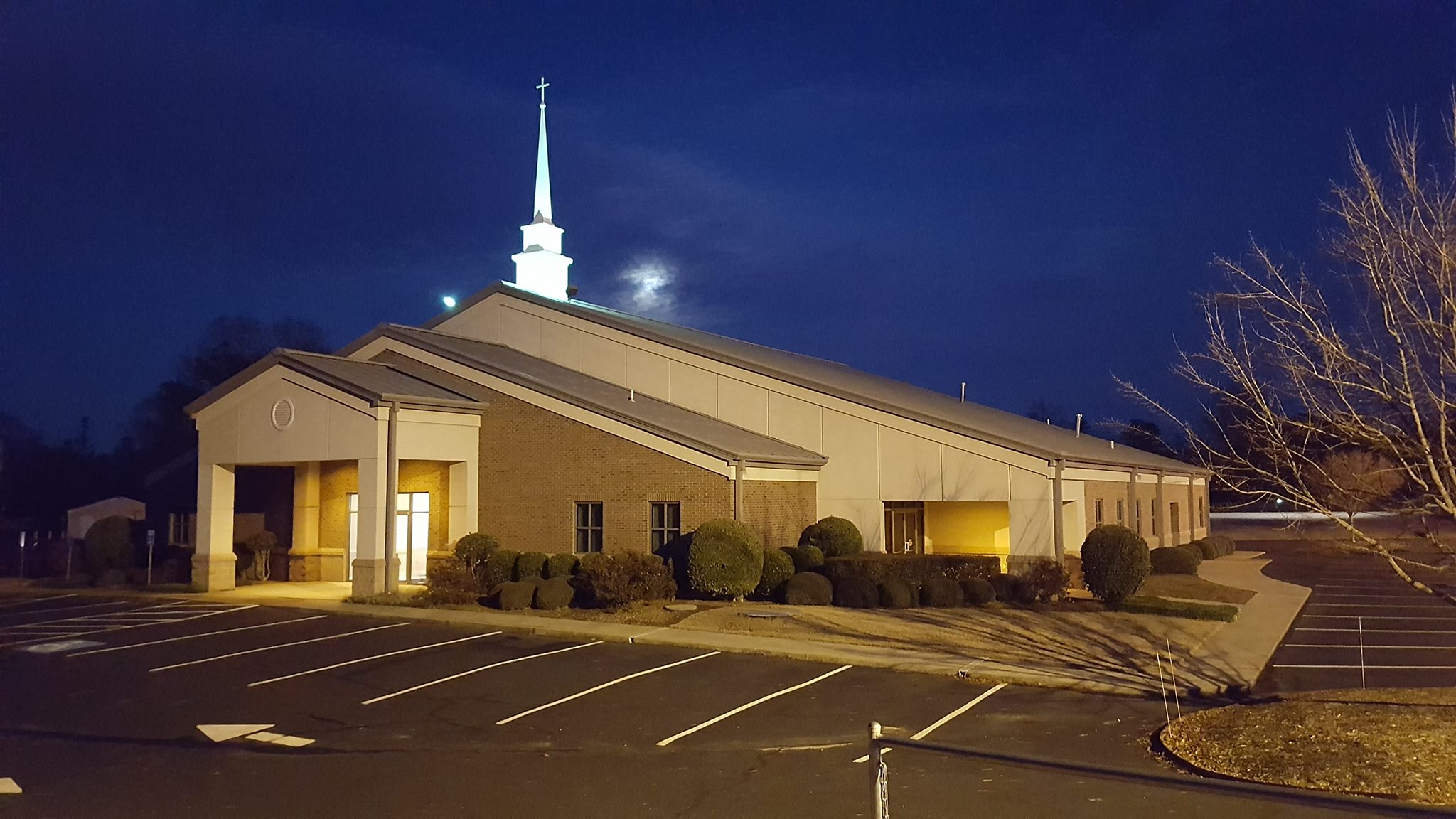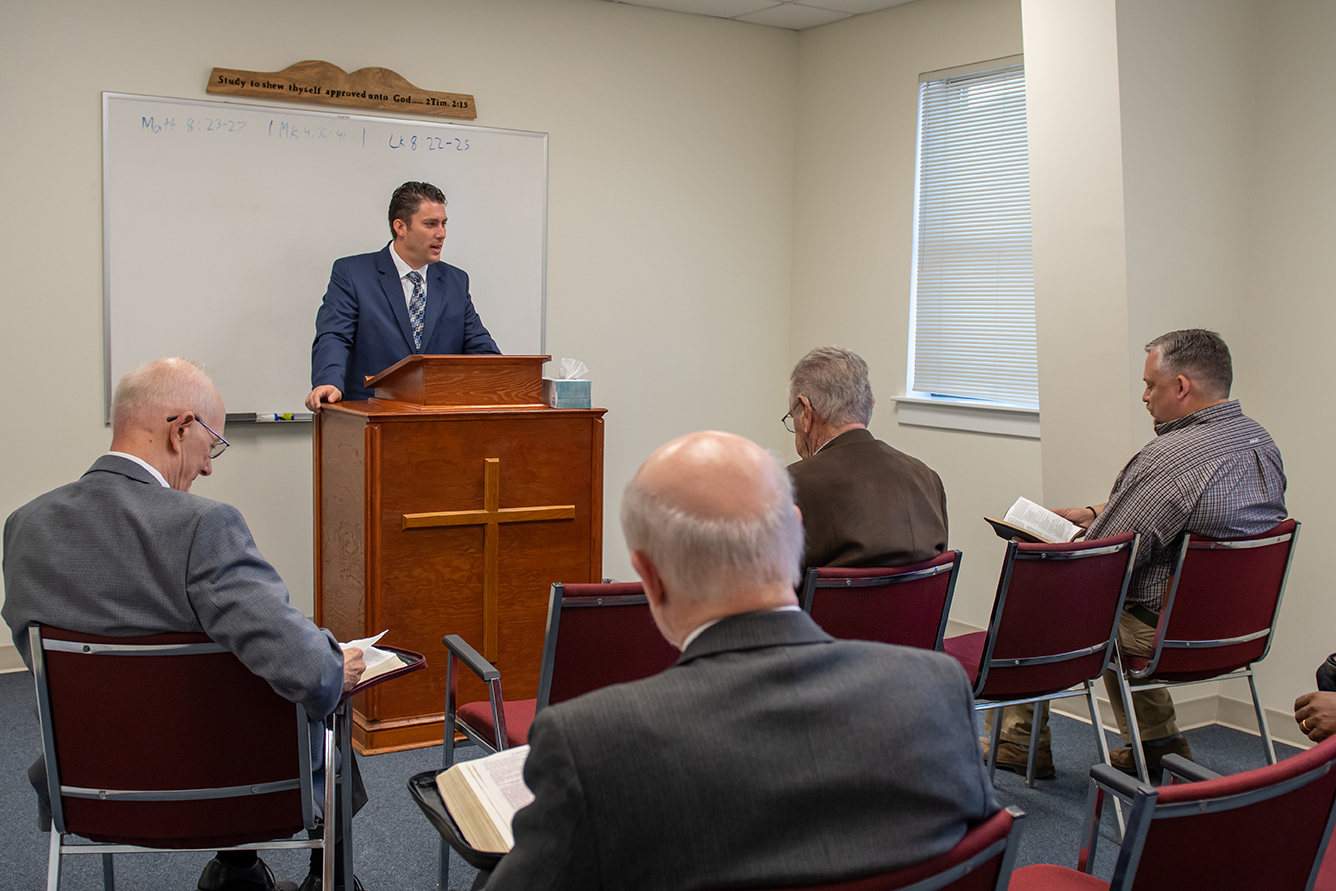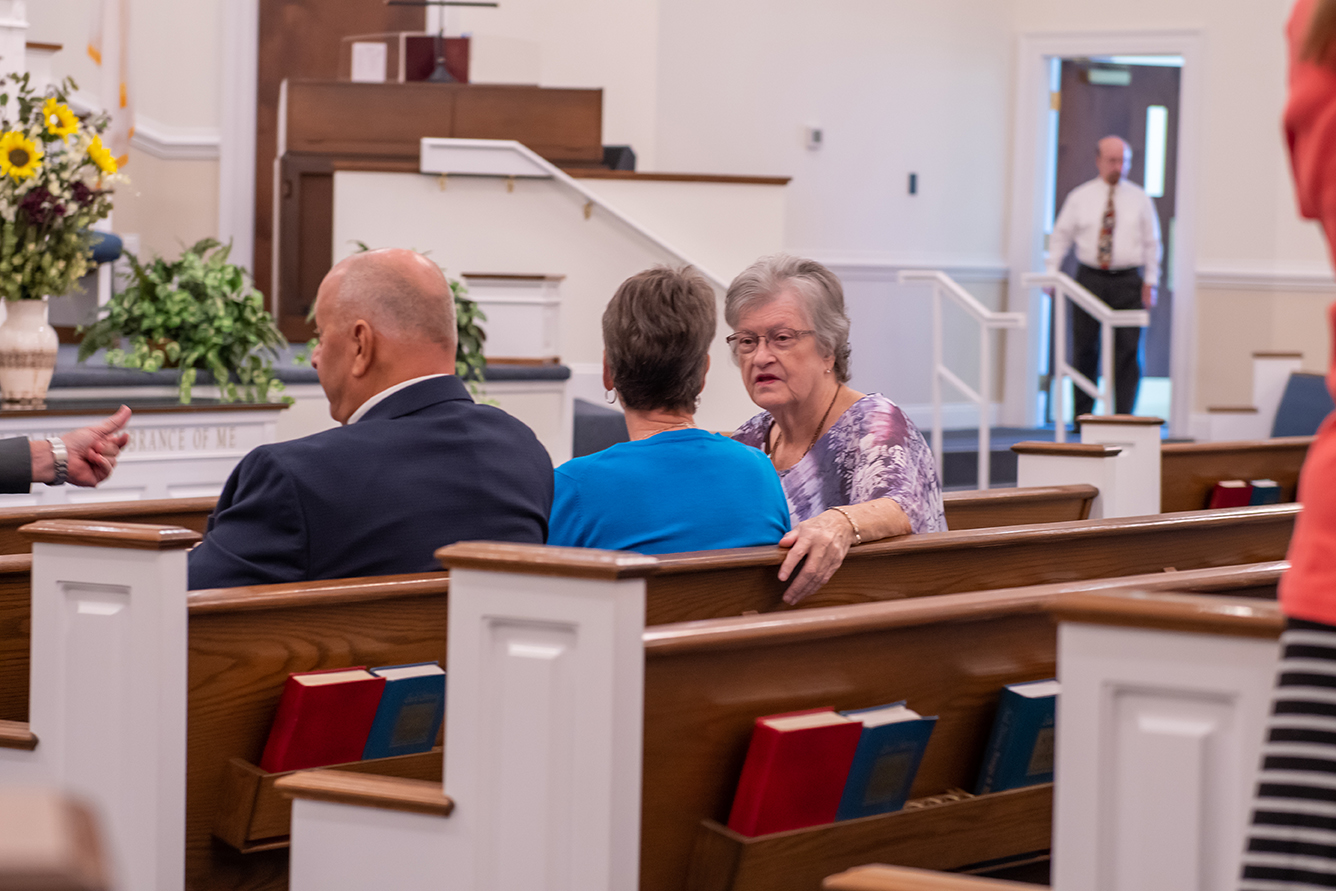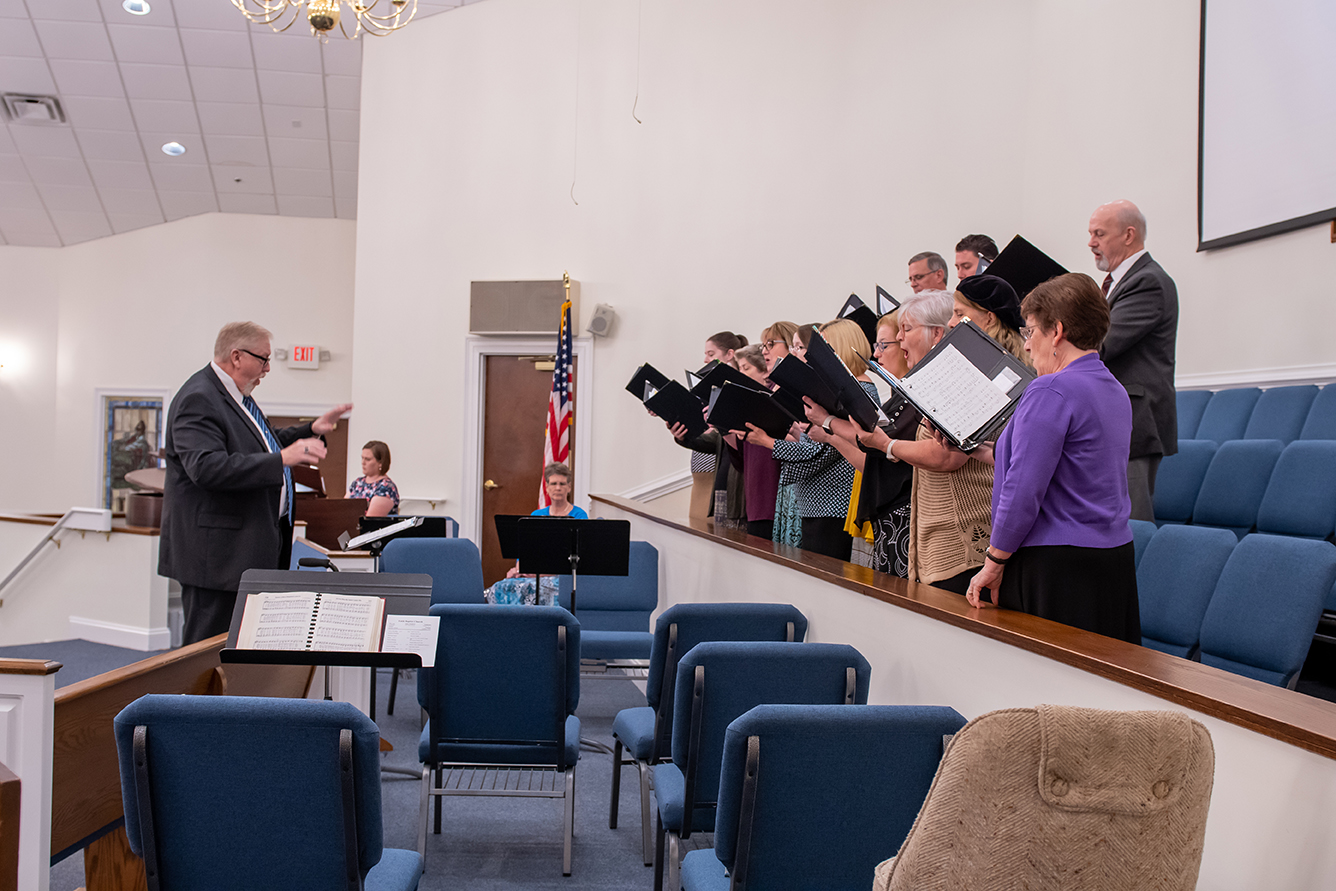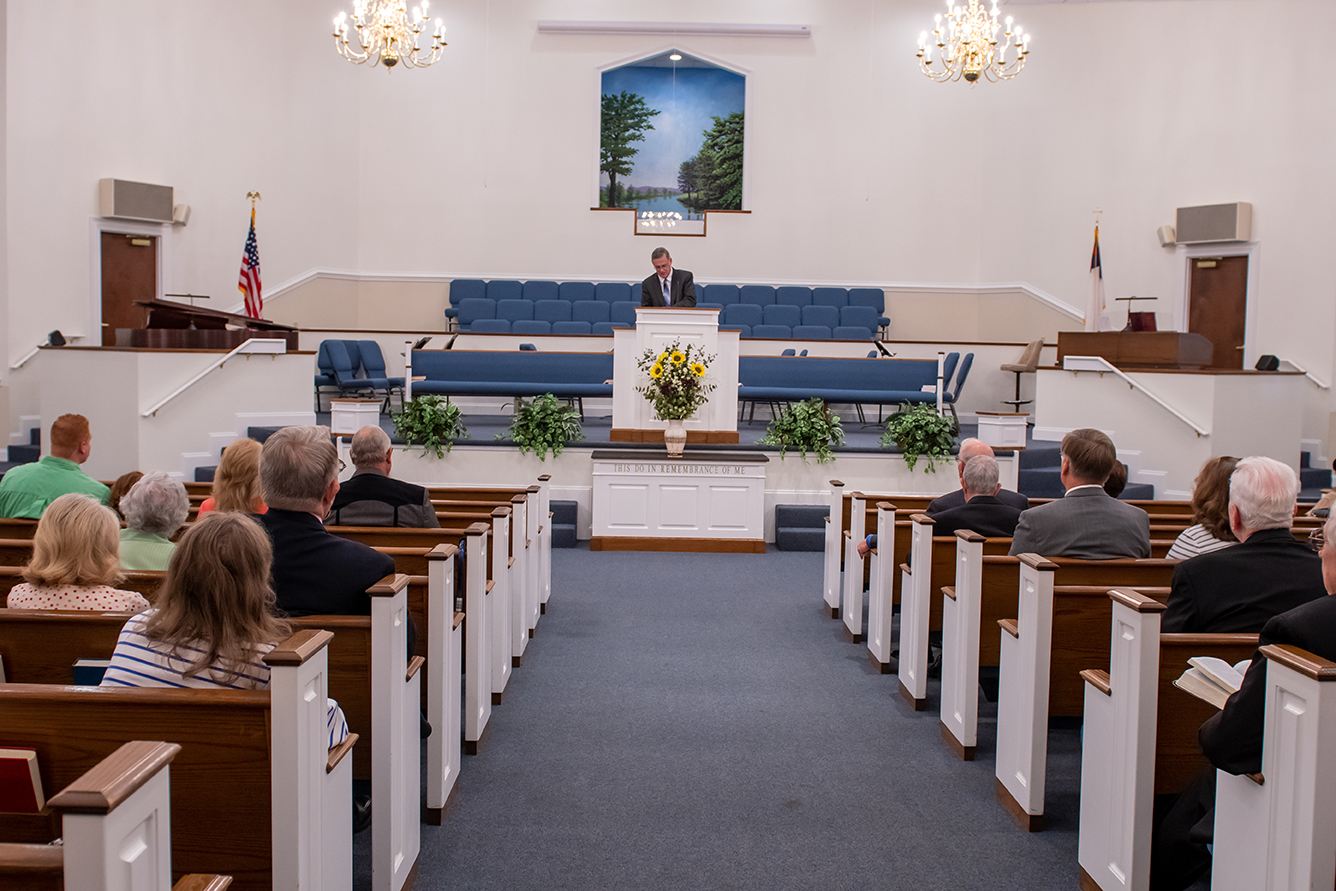Sunday School for all ages
Sunday Morning Worship
Sunday Evening Worship
Wednesday Prayer Meeting and Children's Ministries

Find Your Place
We are a local body of believers seeking to serve the community of Simpsonville, South Carolina. We welcome you to visit with us and find a place to worship, connect and serve.
What We Believe
Faith Baptist Church of Simpsonville is an independent, fundamental Baptist church. We are independent, meaning that we do not belong to a denomination or organization of churches. We are fundamental, meaning that we hold to the historic Baptist doctrines such as inerrancy of Scripture, salvation by grace alone, eternal security of the believer, and the imminent return of Christ. We are conservative and traditional in that we worship the Holy Lord who deserves both our reverence and our obedience. This is seen in our services which emphasize the preaching and teaching of Scripture, with music that is designed to edify rather than for entertainment. This statement emphasizes main doctrines, and the Scripture verses used are representative and not to be considered exhaustive.
We believe the Holy Scriptures, composed of the thirty-nine books of the Old Testament and the twenty-seven books of the New Testament, are the verbally inspired Word and Revelation of God. The Bible is inerrant, infallible, and God-breathed. We believe in the miracle of divine preservation of God's Word. In the English language, the King James Bible is accurate and gives the Bible an integrity so that we can unashamedly say, "Thus saith the Lord." Psalm 19:7-11; 2 Timothy 3:16-17; 2 Peter 1:16-21; Luke 24:13-28; John 16:12-16; Psalm 12:6-7; Isaiah 40:8; Psalm 138:2
We believe in the Triune God - God the Father, God the Son, and God the Holy Spirit - coequal and coeternal. Each has His individual identity and separate responsibilities for the purposes of redemption, yet are perfectly united as three Persons in One. I John 5:1-8; John 16:7-18; Matthew 28:19; Genesis 1:26
We believe in the Deity of Jesus Christ. He is the only begotten, virgin-born Son of God, the second Person in the Blessed Trinity, God the Son and God manifest in the flesh. 1 Timothy 3:16; John 1:1-14; John 14:9; Isaiah 7:14; Matthew 1:18-25; John 10:36
We believe in the substitutionary atonement of the Lord Jesus Christ. He, by the grace of God, tasted death for every man, and all must be born again or be forever lost. (Hebrews 2:9; John 6:44-69; John 3:1-18; Romans 3:25; Revelation 1:5; Hebrews 9:22; I Peter 1:18-19) The Lord's atonement was not limited with respect to whom God's salvation is offered, i.e., His shed blood is sufficient for all sin and, therefore, "whosoever will" may believe and be saved to the uttermost. I John 2:2; Hebrews 7:22-25; Revelation 22:17
We believe in the physical resurrection of our Lord Jesus Christ. He ascended bodily into the heavens and is now at the right hand of God as our Mediator, Priest, and Advocate. Acts 3:12-26; John 20; Hebrews 9:24; I Corinthians 15:12-28; I John 2:1
We believe in the Rapture - the personal, premillennial, pretribulational, and imminent return of our Lord and Saviour Jesus Christ "in the air." This has been the "Blessed Hope" of every born-again believer in the Church Age. At that time, He will receive to Himself the resurrected bodies of those who have "died in Christ" and also all those who are presently alive and "in Christ." (I Thessalonians 4:13-18; 5:6-10; I Corinthians 15:50-55; Acts 1:11; Titus 2:13) He will then come "with His saints" seven years thereafter to execute judgment upon the ungodly nations before the inauguration of His earthly millennial reign at His second coming to the earth. (Jude 14-15; Matthew 25:31-46) The Lord will cast the anti-christ and the false prophet into the lake of fire, send Satan into the abyss, and establish His earthly kingdom. The Lord Jesus Christ will reign one thousand years, thus, literally fulfilling the covenant promises made to a believing remnant of Israel through the Patriarchs of the Old Testament. (Isaiah 11:1-16; Revelation 19:19-20; 20:1-6) After the earthly reign of one thousand years, He will bring all the unsaved dead to the judgment of the Great White Throne, and all who stand before that Throne will be cast forever into the lake of fire. (Revelation 20:11-15; Matthew 7:21-23)
We believe in the personality of Satan, "that old serpent, called the Devil, and Satan, which deceiveth the whole world." He is actively opposing the cause of Christ on every hand and is the arch enemy of every true believer. His warfare incorporates the deception of mixing error and truth as well as that which is flagrantly vile and evil. II Corinthians 11:1-15; 2 Peter 5:8-9; Revelation 12:9-10; Matthew 4:2-11; Isaiah 14:12-17; John 8:24 His ministers can also serve to deceive the unsuspecting by "transforming themselves into the apostles of Christ . . . [and] ministers of righteousness" II Corinthians 11:13, 15. Therefore, every experience and teaching must be examined in light of the Word of God to determine its true source. Isaiah 8:20; I John 4:1
We believe that Heaven is a real place of eternal blessedness prepared by God for those whose garments have been "made white" through faith in the shed "blood of the Lamb." Hell is a real place of eternal suffering for those whose names are not written in the "book of life." There is no intermediate state in which the unsaved can atone for his own sins. John 14:1-6; Revelation 7:13-17; 20:11-15; 21:22-27; II Corinthians 5:1-10; Luke 16:19-31
We believe God created all things in a time frame of six literal, twenty-four hour days. We believe in the universality and exceeding sinfulness of sin. In Adam all have sinned and, therefore, are guilty before God by nature as well as by deed. Man was created by a direct act of God and subsequently fell into sin in the Garden of Eden. Romans 5:12-21 Ezekiel 18:4; Romans 3:10-26; 6:23; Psalm 51:5 Genesis 1-3
We believe that man is justified on the single ground of faith in the shed blood and bodily resurrection of our Lord and Savior Jesus Christ. Romans 5:1 Ephesians 2:8-9 The all-sufficient and completed work of Redemption accomplished through His death and resurrection is fully appropriated to whosoever will receive by faith the free gift of salvation. The adding of works, baptism, sacraments, or any other condition placed upon man in order to obtain God's gift of salvation results in "another gospel" that is under God's curse. Galatians 1:6-10; Romans 1:16 I Corinthians 15:1-4; John 5:24; Ephesians 5:8
We believe in the eternal security of all believers in our Lord Jesus Christ. Once a lost sinner has become “a new creature” in Christ, he can never lose that new relationship in the family of God which is based upon Christ's imputed righteousness and not his own. The life that God imparts to the believing sinner is not "eternal life" if it can be terminated. II Corinthians 5:14-21; John 10:25-29 Sin in the life of the believer affects his fellowship with the Father, not his sonship. All who are truly born of the Spirit and who continue in sin will be dealt with by the chastening hand of God. I John 1:5-10; Hebrews 12:6-13 I Corinthians 3:11-15 All who are in Christ are sealed unto the day of redemption and will be glorified. We are to "work out" our salvation not "work for" our salvation (Philippians 2:12). Texts used to supposedly teach one can lose his salvation are speaking of loss of reward, not the loss of salvation or the right to be called a child of God. I Corinthians 3:8-15; 2 John 8; Revelation 3:11; Romans 8:29-30; I Timothy 1:12; Ephesians 1:13-14; 4:30
We believe all regenerated people are baptized into the Body of Christ by the Holy Spirit the moment they receive Christ as their Savior. I Corinthians 12:13; 10:32; Ephesians 2:13-18 The Holy Spirit indwells all who have been born again from above. Also, the baptism of the Spirit is not a separate event apart from the reception of the gift of the Holy Spirit upon believing on Christ unto salvation. Acts 15:6-11; Galatians 3:2, 14; Romans 10:13 -17; Romans 8:9 The Church which is Christ's Body consists of all those who, in the present dispensation, truly believe and accept Jesus Christ as Savior and Lord. Romans 8:14-27; James 1:18; John 1:12; I Corinthians 1:2; Matthew 16:16
We believe that all Christians are first to be separated wholly unto the Lord, and as a necessary result, they must be: 1) Separated from worldly and sinful practices. They are to be holy, even as He is holy, and this desired behavior will always be diametrically opposed to the course of this present age. I Peter 1: 13-16; I Corinthians 6:19-20; Romans 12:1-2; I John 2:15-17. 2) Separated from apostasy and unbelief. A believer must not be "unequally yoked together with unbelievers," thereby, being identified with unbelief by association, whether in ministry, worship, or by joint religious activities. II Corinthians 6:14-18; I Timothy 6:3-5; 2 Timothy 2:19-22; 3:1-5; Amos 3:3 3) Separated from disobedient brethren and doctrinal compromise with respect to all ministry and service. A believer is identified with the doctrinal positions and practices of those he is in fellowship with, both before God and man. Separation from those who are not walking according to truth deters the leavening effect of compromise and gives a faithful warning to the erring brother. Romans 16: 17;II Thessalonians 3:6,14-15; II John 10-11; Galatians 2:9-11; I Corinthians 15:33
We believe God has ordained the ministry of local, independent, indigenous assemblies of believers to accomplish His work. The church's membership is to be composed of regenerated, baptized believers. The two ordinances of the local church are believer's baptism by immersion and the memorial of the Lord's Supper until He returns. The church is to be missionary-minded and evangelistic in spreading the Gospel into all the world. It is not the mission of the church to "bring in the Kingdom," work for political or economic justice, major on social improvement, or "Christianize" society. Its mission is to strive together for the faith of the Gospel, proclaim and maintain purity of doctrine and practice, and worship and serve the Lord in "spirit and truth." Acts 2:41-47; 20:17-32; Matthew 28:16-20; Ephesians 4:11-16; I Corinthians 11:23-34
We believe that all followers of the Lord Jesus Christ should maintain good works, a "good work" being that which is done in obedience to the will of God as revealed in the Word of God. Works will determine the believer’s reward or loss of reward at the Judgment Seat of Christ before which every Christian will stand. Every believer must realize his responsibility before God to "maintain good works," i.e., walk in the light of the Word of God. The Bible is the believer's absolute Standard of faith and practice, his perfect Counsel. The Word provides him with "all things that pertain unto life and godliness" (2 Peter 1:3-4). The Bible, not any form of psychological counseling or therapy, is the answer. Ephesians 2:8-10; Titus 2:11-14; 3:1-11; I Thessalonians 5:23; I Corinthians 1:18-29; 3:8-15; II Corinthians 5:9-11
We believe music should: 1) Glorify God 2) Edify the saints and 3) Testify of the Holiness, Love and Might of God. Psalm 96:1-2; Colossians 3:16 We believe the purpose of music in the church is not to entertain or to attract prospective members and converts. It is our desire to demonstrate and practice Biblical truths and principles that we believe Scripture reveals as Godly forms and functions of music within our ministry. Music has been the subject of debate throughout history, especially as it relates to worship. This issue has been aggravated by continued exposure to subtle and not so subtle forms of music that have made inroads into church music. Add to this mixture a multitude of backgrounds and experiences, and the result is a broad range of acquired musical tastes. Because music is a MORAL vehicle, we believe that certain styles of music cannot deliver a moral message that would glorify a Holy Lord. This is primarily why we avoid what is produced in Contemporary Christian Music. The general movement of CCM attempts to carry a moral message that should appeal to the spirit, through an immoral vehicle of music that appeals to the flesh. The one corrupts the other and thus hinders the spiritual growth of the believer. There are those who state that such music must be used if we are to reach the lost, but there is no Biblical support for evangelism through music (music was for the saints; evangelism is only a by-product). It seems quite inappropriate to use ungodly vehicles to reach ungodly people. If we want to change a person’s condition, we must not use those elements that contribute to his current condition. Ephesians 5:9-11

